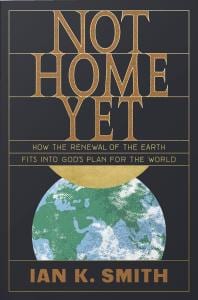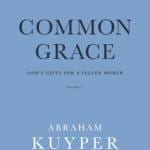For various and largely unconnected reasons, I’ve spent the last few months thinking about the end of the world. More specifically, I’ve spent the last few months thinking about the relationship between the world we live in now and the coming kingdom of heaven. On my podcast we’ve been talking about Niebuhr’s classic work Christ and Culture. On this blog I’ve been working through Abraham Kuyper’s Common Grace (especially this post). And I’ve been reading for review the subject of this post, Ian K. Smith’s Not Home Yet: How the Renewal of the Earth Fits in to God’s Plan of the World.
There have been a lot of passages of Scripture thrown around in the past few months, but I think a typical one is Revelation 21:1-2 (ESV)
“Then I saw a new heaven and a new earth, for the first heaven and the first earth had passed away, and the sea was no more. And I saw the holy city, new Jerusalem, coming down out of heaven from God, prepared as a bride adorned for her husband.”
The question is, what happens to the “old city,” the old Jerusalem? What does it mean that the first heaven and the first earth had ‘passed away’? The main discussion comes between two camps. One argues that the ‘passing away’ of the first heaven and the first earth means they are destroyed/broken and set aside/some other parallel language and replaced by a new heavens and a new earth (this is largely where I fall, I think). The other approach, promoted in Not Home Yet, argues that the old heavens and the old earth are not eliminated, but rather are transformed into the new heavens and the new earth:
“The resurrection of Jesus points to something far bigger than just access to heaven; the resurrection points to the renewal of God’s creation. When we understand this scope of God’s work of salvation, reductionistic and individualistic views are lacking in the grandeur of what God is going to do. Jesus’s resurrection does not only guarantee my resurrection–important thought that is. Jesus is going to raise the universe!” (12)
Specifically, God through the work of Christ is going to reform and revivify the fallen creation so that it is the home promised and prepared for God’s people. When we forget this, or when we reduce salvation to something relevant only for the individual, we run the risk of devaluing our physical lives (including taking up a gnostic view of our bodies) and begin to neglect the important work of creation care and stewardship. And most importantly, he thinks that this view of a renewed creation is the Biblical one.

Right off the bat (or, you know, five hundred words into the review), I should point out that I agree with most of what is said in Not Home Yet. Christians shouldn’t despise the body or the physical world. Both are fallen, but both are also made good for the glory of God. What’s more, we’re going to agree on most practical issues that Christians are likely to run into in their day-to-day lives. Whichever view of the new heavens and new earth we take, both of us are going to encourage faithfulness in our daily lives. A Christian should always strive to be more patient, kinder, more loving, gentler, etc in the workplace and at home, regardless of whether they see that workplace as a temporary stewardship that will some day cease to exist or as a lasting investment that will some day be transformed into something eternal.
Smith is surely right that the view that this world is temporary can cause problems if applied incorrectly. But that is no argument against the position. If my perspective runs the risk of downplaying the value of the physical creation, the other view runs the risk of downplaying the depth and pervasiveness of sin. I don’t think Not Home Yet does this, though it comes close at times. For example, on pgs 103-105 Smith tells us about his experiences in the tribal society of Vanuatu and how he learned there that ‘Western’ ideas of justification as a means of dealing with guilt mean little to a society where shame, rather than guilt, is the primary felt need. He then points out that ‘guilt’ is likewise on the wane in our own society, and that instead we have different needs:
“I doubt that guilt or shame speaks at the same volume to our current generation [as to previous Western generations]. Furthermore, with the rise of Western skepticism, fear of the supernatural is not a felt need. But within this context, there is yet another aspect of the gospel that speaks with resounding relevance to our increasingly disjointed society: homecoming. With the fragmentation of the family, the breaking down of traditional community structures, and the rise of individualism, many in society ask what it means to belong. We have a hunger for home. We long to reverse alienation. Does the gospel of the death and resurrection of Jesus address this? As with guilt, shame, and fear, the answer is yes.” (105)
Now, there is nothing in this statement that isn’t true. But the fairly obvious omission here and in the two pages leading up to this is the doctrine of sin. No doubt our contemporary society is increasingly callous to feelings of guilt over our sins. How can we feel guilt over what so many are openly celebrating as virtues? Christians ought not respond to this situation by simply dismissing sin and going after what the world does feel like it needs. Instead, we have to do the heavy lifting of expositing the Law, the just punishment that rebelling against God’s Law deserves, and the hope offered in the Gospel. And to his credit, Smith goes on to do just that in later sections. But it is also clear that the temptation to either leave sin out all together or redefine sin as ‘alienation’ or ‘shame’ or any of the other extant felt needs stands open as an easy path for follows of this perspective–just as followers of my perspective can be tempted to disdain the world disproportionately.
As another point of disagreement, I’m not always sold on his exegesis:
“As we come to the end of the Bible, we see not a picture of people being transported to heaven or a picture of heaven. We see a picture of the descent of the New Jerusalem. We see a picture of a new heavens and new earth (rev. 21:1). The heavens and earth that God created (Gen. 1:1) are the same heavens and earth that will be renewed (Rev. 21:1).” (145)
The verse in Revelation being used as a proof text here is the same one cited above in this post, and I think it pretty clearly demonstrates exactly the opposite point Smith is trying to make. The new heavens and new earth are, well, new. The old heaven and old earth have “passed away.” It would seem to be a twisting of the words to make “passed away” = “renewed.” There are other passages that can be used to make this argument, but Revelation 21:1 isn’t one of them. The same applies to most of the examples he uses. This isn’t the place to get into the weeds of the discussion, but virtually all of the examples used in Not Home Yet are examples of things (Eden, the temple, etc) that were not ‘transformed’, they were images and types of coming realities that were broken and replaced by something new. “Transformation” isn’t really the model Scripture gives us for renewal, “recreation” is.
Finally, I don’t particularly find all of his practical arguments compelling either. Talking about the impact of the Gospel, Smith writes:
“It is a simple truth that when people become Christians, it changes them, which should bring about change in all they do. New communities are formed. Society is impacted. Churches come to realize that the work of ministry is not just inward in its focus, with the congregation supporting the church’s programs; it is also outward, with the church supporting the members of the congregation to be distinctively Christian in their respective roles. it is good for every church to think about whether it has the right balance between an inward focus of being supported and an outward focus of supporting.” (119-120)
Obviously, no faithful Christian is going to disagree with this statement. Of course the church should provide a balance of internal building-up between the body of believers and equipping for life and ministry in the world. And yet, that is not to say anything about the nature of that world in which life and ministry are lived. We are pilgrims passing through a fallen world bound for destruction, but that the world is bound for destruction doesn’t make it irrelevant. When we buy a box of diapers, we do so knowing that they will only be with us for a short time. This in no way makes them either unimportant or irrelevant. Their temporary status in our household doesn’t diminish their importance, and the fact that they were created clean and, once soiled, are bound for destruction doesn’t take away from how central a role they currently play in our lives.
Or, to use a more Biblical (and less scatological) example, to agree with Jesus that marriage is a temporary institution that will not last into the new heavens and new earth (Matthew 22:30) does not diminish its value in the present age. In fact, realizing the temporary nature of our stewardship in our families makes is better at obeying Scripture. We see marriage in its proper context and treat it as the temporary blessing it is, using it as a way to better understand the relationship between Christ and the Church (among other things).
And, well, this is a long review already that need not go on. If it isn’t clear from the preceding fifteen hundred words, I thoroughly enjoyed reading Not Home Yet. It certainly gave me a lot to think about and was well-written and thoughtful. What’s more, it challenges us to think well about how to live in God’s good creation as fallen-but-redeemed people.
Dr. Coyle Neal is co-host of the City of Man Podcast and an Associate Professor of Political Science at Southwest Baptist University in Bolivar, MO












